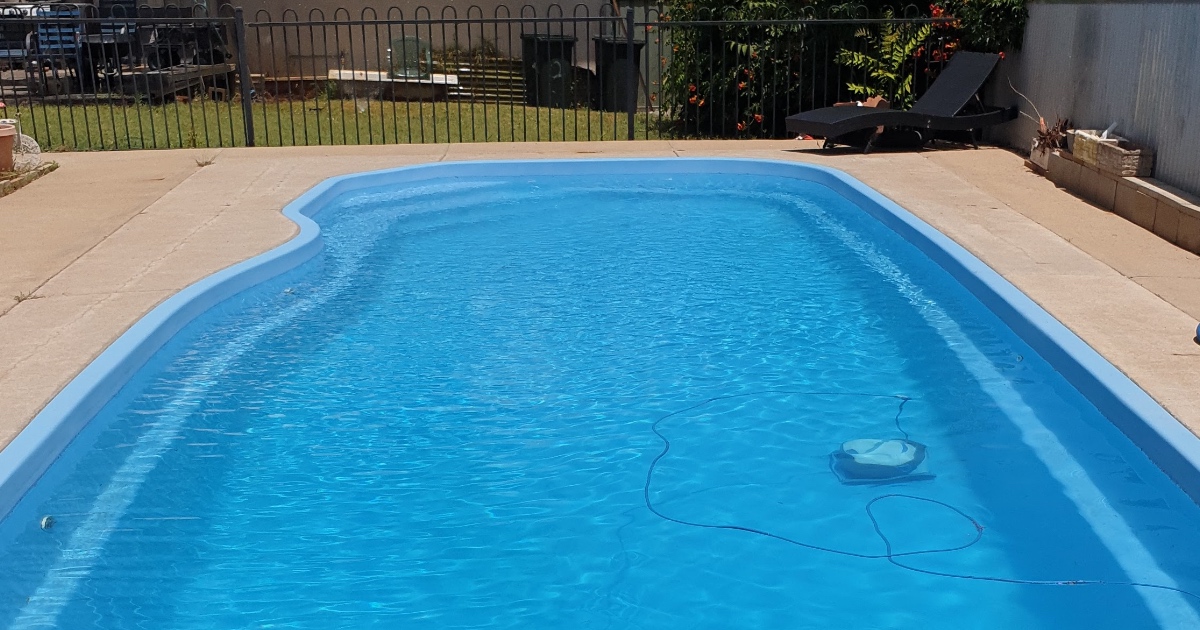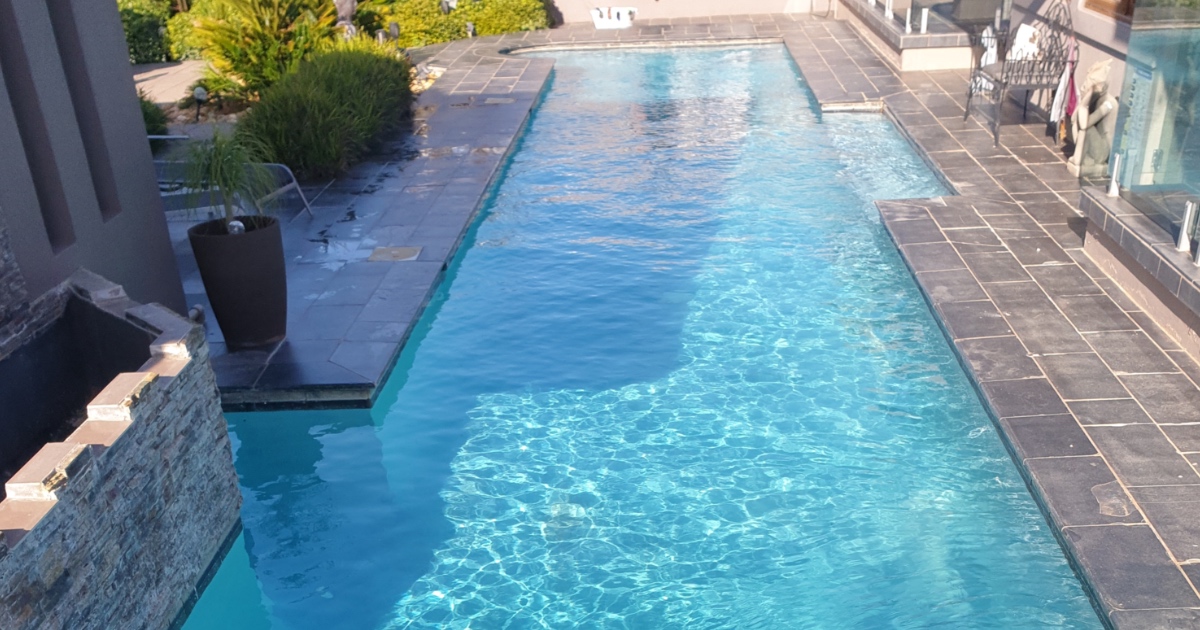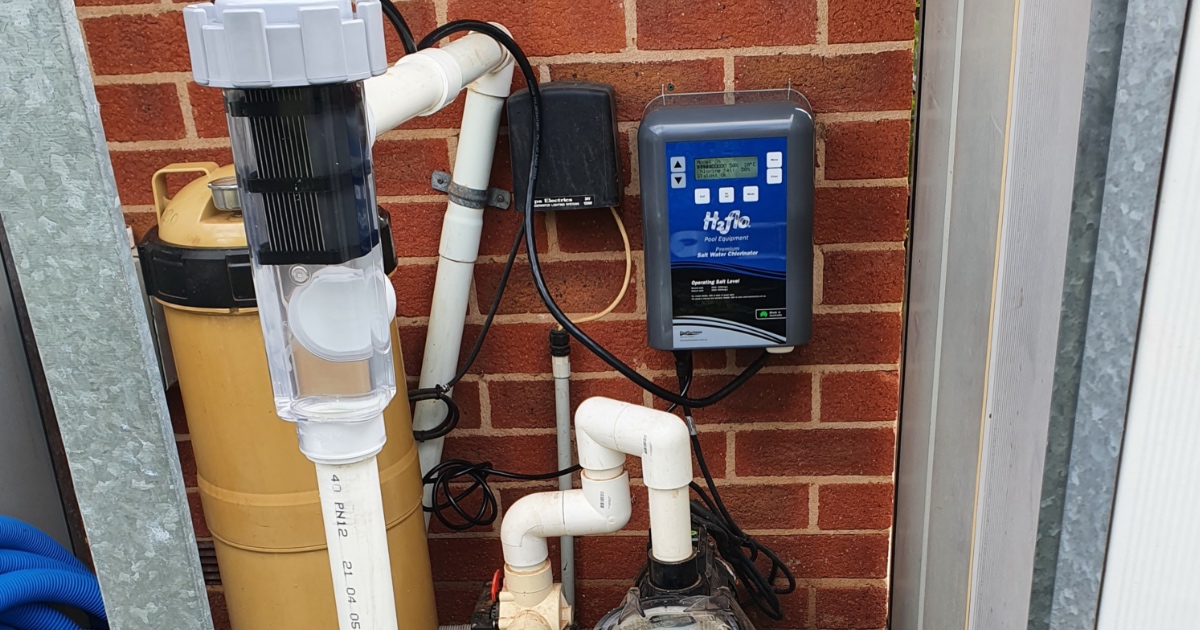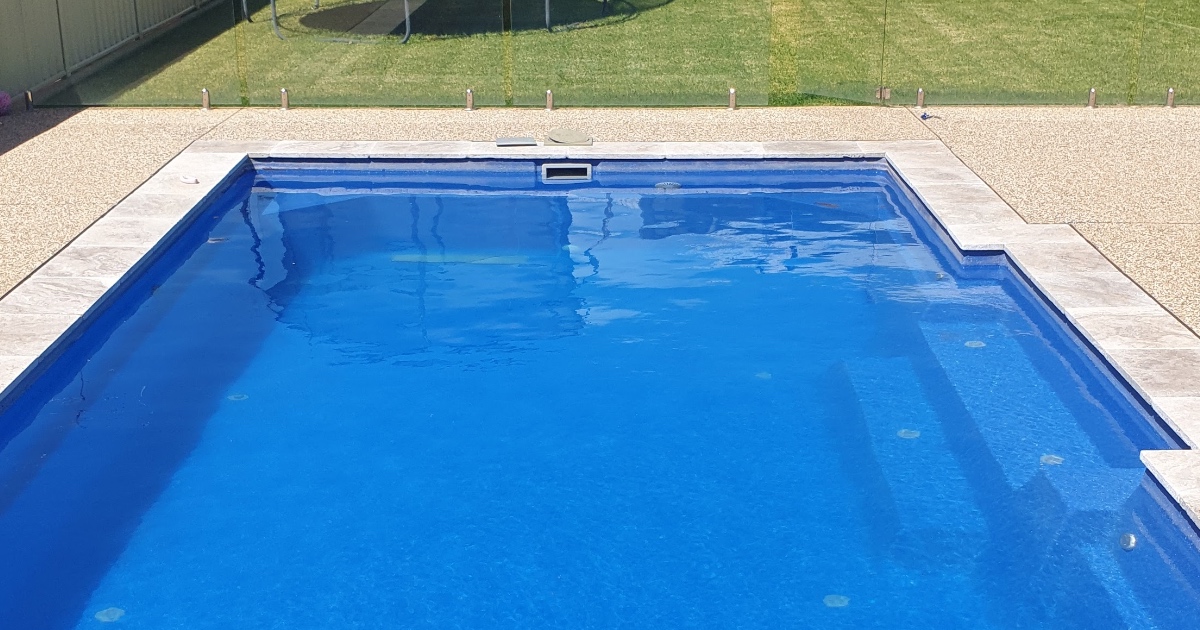What you need to know for your health!
A swimming pool may undoubtedly add a touch of luxury to your home, but there are some critical aspects to consider before you gracefully toe-dip, execute a swan dive, or energetically cannonball into the deep end. It’s not just about the clear blue waters inviting you for a dip, but also about what constitutes those waters, ensuring they are safe and healthy for every splash and stroke you intend to make.
Did you know your body can absorb up to 500mls of pool water for every hour of swimming? This implies the quality of the water you’re swimming in can significantly impact your overall health.
When choosing the perfect pool for your home, it’s important to consider what type of water you want to swim in. Saltwater, mineral, and magnesium pools offer unique benefits and differences in how they operate and what they bring to your swimming experience.
Picking the right pool sanitizing system is a crucial decision in determining the quality of your swimming experience and the pool’s upkeep. Various sanitising options are available, each with unique advantages and considerations. Traditionally, chlorine has been the go-to choice for pool sanitation, but newer systems like saltwater, mineral, and magnesium provide innovative and often healthier alternatives. Analyzing factors such as water quality, maintenance requirements, cost, and your personal health considerations will guide you in choosing the most suitable system for your pool. Remember, investing in a high-quality sanitizing system not only ensures a safer and more enjoyable swim but also contributes to your pool’s longevity and aesthetic appeal.
In this blog post, we’ll break down the differences between these three types of pools so you can make an informed decision about which one is right for you.

Overview of Chlorine Pools
Chlorine pools are the traditional and most common form of pool sanitation. The chlorine effectively kills bacteria and algae, making the pool safe for swimming. This type of pool requires the manual addition of chlorine, either through tablets, liquid, or granular form, which implies regular monitoring and adjustment of the chlorine levels. However, compared to other options such as saltwater pools, UV pools, or ozone pools, chlorine pools can have higher maintenance costs over time due to the continuous need for chemicals.
On the other hand, these pools are usually cheaper to install, easier to operate, and don’t have issues with salt-induced corrosion. However, they may be less gentle on the skin and eyes, and the smell of chlorine can be strong. Each type of pool has its pros and cons, and the choice depends largely on the owner’s budget, time commitment for pool maintenance, personal preference, and concern for the impact on health and the environment.
Benefits of Chlorine Pools
- Effective Sanitizing Agent: The primary benefit of chlorine pools lies in chlorine’s potent sanitizing properties. Chlorine effectively eliminates bacteria, viruses, and algae, ensuring a safe and healthy swimming environment.
- Ease of Operation: Chlorine pools are comparatively straightforward to operate. The process involves adding chlorine manually in either tablet, liquid, or granular form. This simplicity makes chlorine pools a preferred choice for many.
- Quick Impact: Chlorine pools have the advantage of immediate effect when it comes to sanitation. As soon as chlorine is added to the pool, it begins to act on any impurities present, rapidly disinfecting the water. This quick impact makes it easier to maintain the cleanliness of the pool on a consistent basis.

Drawbacks of Chlorine Pools
Chlorine pools typically have higher maintenance costs than other types of pools due to the continuous need for chemicals. Over time, these costs can add up, making them less cost-effective in the long run.
Chlorine can also cause dryness of the skin and hair, and may also lead to eye irritation. People with sensitive skin or allergies may find chlorine pools less comfortable to swim in. Another common complaint about chlorine pools is the strong, lingering smell of chlorine. This odor can be unpleasant to some swimmers and it can persist on skin and swimsuits even after leaving the pool. And finally, chlorine, being a harsh chemical, can have negative impacts on the environment. Residual chlorine that is washed off into the sewer system can eventually make its way into natural water bodies, potentially harming aquatic life.
An Overview of Saltwater Pools
Saltwater pools are becoming increasingly popular because they are gentler on skin and eyes than traditional chlorine pools. Saltwater pools use salt and a generator to create chlorine instead of adding chemical chlorine to the water. There are fewer chemicals used in saltwater pools, which is why they are considered more environmentally friendly. With less need for chemicals, it’s easier to maintain the pH balance of your pool, and you may only need to shock the water once or twice a month, making it easier to maintain overall.

Benefits of Saltwater Pools
- No More Storing Chlorine: Perhaps one of the most significant advantages of saltwater pools is the elimination of the need to store chlorine. With traditional chlorine pools, owners must keep a constant supply of chlorine tablets available for use. These tablets present a number of issues, including the risk of harmful exposure and the inconvenience of storage. With a saltwater system, the generator creates the necessary chlorine, eliminating the need for storage and reducing the risk of accidental exposure to concentrated chlorine. This makes saltwater pools a safer and more convenient alternative.
- Less Harsh: Another notable advantage of saltwater pools is their less aggressive nature compared to traditional chlorine pools. The saltwater in these pools is generally softer on the skin, reducing the risk of skin irritation and dryness. Furthermore, swimmers often report that saltwater is easier on the eyes, leading to less redness and discomfort. This less harsh environment enhances the swimming experience, making it more enjoyable and less likely to cause discomfort or health issues associated with heavy chlorine use.
- Cheaper to Maintain: A significant merit of saltwater pools lies in their cost-effectiveness over time. While the initial setup cost for a saltwater system might be higher than that of a traditional chlorine pool, the maintenance costs are substantially lower. This is primarily because you don’t have to frequently purchase expensive pool chemicals. Furthermore, because the salt cell only produces chlorine as needed, you won’t have to worry about buying, storing, and handling chlorine tablets, which can save substantial time and money in the long run. Hence, a saltwater pool can be a financially smart choice for long-term pool ownership.
Drawbacks of a Saltwater Pool
While a saltwater pool has many advantages, there are also a few drawbacks to consider. The initial installation cost of a saltwater system can be higher than a traditional chlorine pool. The salt can also be corrosive, potentially causing damage to certain types of pool equipment and surfaces if not properly maintained.
Additionally, although less common, saltwater pools can still lead to chlorine-related issues such as eye irritation and dry skin, since the salt in the pool is converted into chlorine. More complex to operate, saltwater pools require a good understanding of the salinity level and the chlorine generation process to keep the water clear and safe to swim in. Lastly, the salt cell, which converts salt into chlorine, is an expensive component that will need to be replaced every 3 to 7 years, which can add to the ongoing maintenance costs.

An Overview of Mineral/Magnesium Pools
Mineral pools use minerals such as magnesium and potassium to sanitize the water instead of chlorine. This offers a more natural experience for swimmers with fewer chemicals and harsh odors. Minerals like magnesium can also help alleviate skin irritations, inflammation and alleviate body aches. The mineral content in the water can also enhance the healing and therapeutic aspects of using the pool. Compared to saltwater or chlorine pools, mineral pools provide a softer feel to the water, and the minerals used create an almost silky texture that feels good on the skin.
Magnesium pools are a newer pool trend and are known for their pure health benefits. In these pools, magnesium chloride replaces the traditional chlorine. Magnesium pools are seen as more natural and eco-friendly compared to traditional chlorine pools but can be pricier.
Benefits of Mineral/Magnesium Pools”
- Health: Magnesium pools offer several health benefits that can significantly enhance your swimming experience. The magnesium chloride in the water is known to alleviate stress and promote relaxation. It accomplishes this by regulating nerve and muscle function, which in turn can help reduce anxiety and promote more restful sleep. Furthermore, the magnesium can help to improve skin health by reducing inflammation and hydrating the skin. This makes it particularly beneficial for those with skin conditions like eczema. Not to mention, the mineral is also involved in protein synthesis and energy production, improving overall body function. In essence, swimming in a magnesium pool can offer you a beneficial and healing experience, contributing positively to your overall well-being.
- Softer Water: Magnesium pools provide an additional benefit that goes beyond health considerations: the softness of the water. Traditional chlorinated pools can often leave a harsh and dry sensation on your skin due to the heavy use of chemicals. Magnesium pools, on the other hand, provide a unique, softer feel to the water. This is due to the presence of magnesium chloride, which creates an almost silky texture. Swimming in a magnesium pool feels smooth and luxurious, enhancing the overall pool experience. This softer water is not only gentler on your skin but also causes less irritation to your eyes. Hence, a magnesium pool can be a great choice for those seeking a more comfortable and soothing swimming experience.
- Easy Maintenance: Magnesium pools are renowned for their ease of maintenance, representing a significant advantage over traditional pool types. The magnesium chloride used in these pools functions as a natural clarifier and flocculant, assisting in keeping pool water clean and clear. It reduces the need for additional chemicals, resulting in fewer fluctuations in pH levels and less time spent on balancing water chemistry. The mineral also inhibits algae growth, reducing the likelihood of green water and the need for regular algaecide applications. In essence, a magnesium pool offers health benefits and ensures a hassle-free pool maintenance experience, contributing to its growing popularity among homeowners.

Drawbacks of a Magnesium Pool
Despite the numerous advantages, magnesium pools do come with a few drawbacks that potential owners should consider. First, installing a magnesium pool can be quite expensive compared to traditional chlorinated or saltwater pools. This is due to the requirement for a specialised mineral system that adds to the overall expense.
While magnesium pools require fewer chemicals for maintenance, they are not completely chemical-free. You’ll still need to monitor and adjust pH levels regularly to ensure the water remains safe and comfortable for swimming.
Lastly, there’s also the question of the environmental impact. The process of producing magnesium chloride can contribute to carbon dioxide emissions, which is a concern for environmentally conscious people.
Ultimately, the decision to install a magnesium pool should weigh the health benefits and luxurious swimming experience against these potential drawbacks.
Picking the right pool can add value to your home and enhance your summer experience. We hope that this guide has given you a better understanding of the differences between saltwater, mineral, and magnesium pools. Consider your options and find the right pool that can offer you the benefits that you’re looking for. Whether it’s a saltwater, mineral, or magnesium pool, you’re sure to make a splash with any of these options.
If you’d like guidance and feedback, contact the Inland Pool team today!
